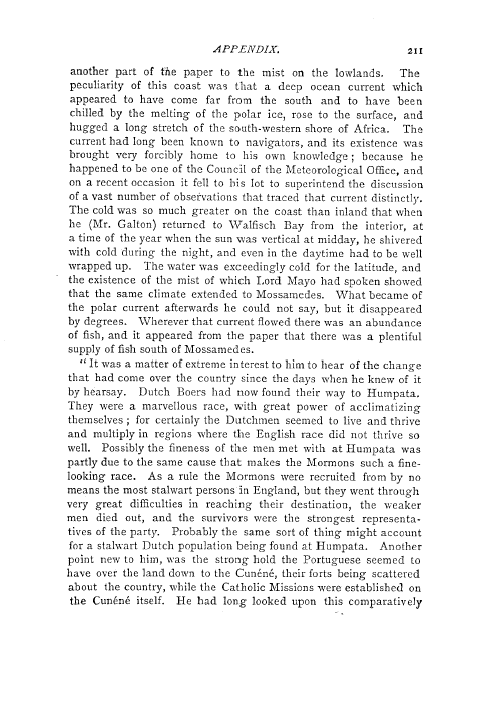APPENDIX. 211
another part of the paper to the mist on the lowlands. The peculiarity of this coast was that a deep ocean current which appeared to have come far from the south and to have been chilled by the melting of the polar ice, rose to the surface, and hugged a long stretch of the south-western shore of Africa. The current had long been known to navigators, and its existence was brought very forcibly home to his own knowledge ; because he happened to be one of the Council of the Meteorological Office, and on a recent occasion it fell to his lot to superintend the discussion of a vast number of observations that traced that current distinctly. The cold was so much greater on the coast than inland that when he (Mr. Galton) returned to Walfisch Bay from the interior, at a time of the year when the sun was vertical at midday, he shivered with cold during the night, and even in the daytime had to be well wrapped up. The water was exceedingly cold for the latitude, and the existence of the mist of which Lord Mayo had spoken showed that the same climate extended to Mossamedes. What became of the polar current afterwards he could not say, but it disappeared by degrees. Wherever that current flowed there was an abundance of fish, and it appeared from the paper that there was a plentiful supply of fish south of Mossamedes.
"It was a matter of extreme interest to him to hear of the change that had come over the country since the days when he knew of it by hearsay. Dutch Boers had now found their way to Humpata. They were a marvellous race, with great power of acclimatizing themselves ; for certainly the Dutchmen seemed to live and thrive and multiply in regions where the English race did not thrive so well. Possibly the fineness of the men met with at Humpata was partly due to the same cause that makes the Mormons such a finelooking race. As a rule the Mormons were recruited from by no means the most stalwart persons in England, but they went through very great difficulties in reaching their destination, the weaker men died out, and the survivors were the strongest representatives of the party. Probably the same sort of thing might account for a stalwart Dutch population being found at Humpata. Another point new to him, was the strong hold the Portuguese seemed to have over the land down to the Cunene, their forts being scattered about the country, while the Catholic Missions were established on the Cunene itself. He had long looked upon this comparatively

